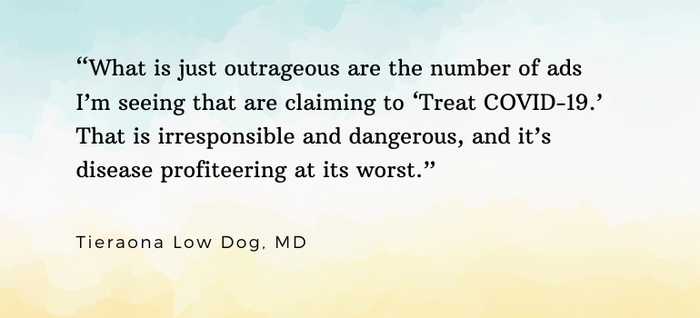
Few were surprised when the supplement industry’s shadow dwellers crawled out of the dark early into the pandemic and declared that their products were effective preventions and cures. The trade associations quickly condemned the claims, and the FDA wrote warning letters almost immediately.
More warning letters are undoubtedly in the hopper, and the question now becomes whether the target widens. Ivan Wasserman, managing parter at Amin Talati Wasserman, says that brands using “coronavirus” were obvious and easing pickings for regulators but that any mention of “virus” or “viral” could wind up in the next round. If coronavirus call-outs were the low-hanging fruit, “they’re going to start looking at the medium hanging fruit next,” Wasserman says.
The puzzlement in all of this is why companies would feel compelled to put any such language in marketing. “Immunity” is still a safe marketing term, if it’s done carefully. “If people want to say ‘immunity’ with a picture of somebody with a mask on that’s a bad idea,” says Wasserman. That even products with a tangential connection to immunity are flying off the shelf, suggests pushing-the-envelope isn’t necessary.
At Quality of Life Labs, Dan Lifton says the brand has been careful in its messaging. The company looked at several different ideas on imagery before deciding that handwashing was OK. Quality fo Life Labs also has science behind the Kinoko AHCC product suggesting efficacy in viral infections, but it is not connecting that science directly to COVID-19, or any virus. “That data is very compelling, but communicating it in a regulatory compliant way is very challenging,” Lifton says.

Directly linking a product to viruses looks like exploitation, Lifton explains, and anything smacking of exploitation is a black eye for the industry. It’s “reputation damage” not just for his brand but supplements in general, he says. “We’re being ultra, ultracareful.”
The potential for pandemic profiteering is especially troubling for Dr. Tieraona Low Dog. An M.D. well-known for balancing alternative and allopathic medicine, she sees dietary supplements like vitamin C, zinc, quercetin, and elderberry as “totally reasonable to have on hand during the cold and flu season,” and explains that “COVID-19 is a part of that whole cycle.” “I have no issue with companies promoting them for supporting immune health,” she adds.
Moving beyond “immune health,” the problems become very clear, very quickly. “What is just outrageous are the number of ads I’m seeing that are claiming to ‘Treat COVID-19.’ That is irresponsible and dangerous, and it’s disease profiteering at its worst,” Low Dog says.
Claims are an obvious question for finished product brands, and one that’s relatively easy to answer with care, but ingredient companies may also need to be watchful.
Takeaway: The FDA has already come down on brands making specific claims around COVID-19, but any mention of "virus" or "viral" could be a regulatory risk.
Chromadex co-founder Frank Jaksch found that out in early March when a company began linking nicotinamide riboside, the ingredient in the company’s TruNiagen product, to the pandemic with the email subject line: “Could NAD+ change the trajectory of the COVID-19 pandemic?” Chromadex responded immediately: “There are no published human clinical studies evaluating the effects of Tru Niagen supplementation with the coronavirus. As such, no health claims can be made related to COVID-19 at this time,” the company explained in a statement. Jaksch says the instance highlights how quickly things can get out of control.
“They’re trying to capitalize on people’s fear,” he says,
Jacksch says even when studies suggest an ingredient may have effects on viruses, nobody should be making that claim without bulletproof evidence. And even with that evidence, it’s not the right time to be showcasing it. “We have a tremendous story that we could presumably tell, but we are not going to tell it,” Jaksch says.
Consumers’ understandable urgency in the current environment provides fertile ground for shenanigans, Jaksch says, making it even more important that brands maintain marketing discipline.
That “black eye” that worries Lifton, some believe, could turn into a backlash.
Pandemic Potential Part 7
<< Go back to Essentials article | Go to next article: Enforcement Issues >>
About the Author(s)
You May Also Like





